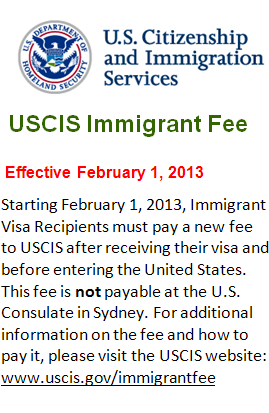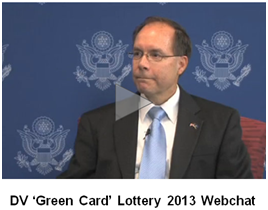Immigrant Visas
Immigrating to the United States
An immigrant visa is required of anyone who wishes to enter the United States to reside there permanently, whether or not that person plans to seek employment in the United States.
General Information
There are four main methods of immigration to the United States: through an immediate relative, through family, through employment, and the Diversity Visa Lottery program, commonly known as the “green card” or “DV” lottery.
In order to be eligible to apply for an immigrant visa other than through the lottery, a foreign citizen must be sponsored by a U.S. citizen relative(s) or by a prospective employer.
For an overview of the types of immigrant visas available under immigration law, please see the U.S. Citizenship and Immigration Services (USCIS) website, www.uscis.gov.
Effective August 15, 2011, petitioners residing overseas are no longer able to routinely file Forms I-130, Petitions for Alien Relative, with U.S. Embassies and Consulates except in locations where U.S. Citizenship and Immigration Services (USCIS) has a public counter
presence within the Embassy or Consulate. Petitioners residing overseas in countries where USCIS does not have a public counter presence will be required to file their Forms I-130 by mail with the USCIS Chicago lockbox. U.S. Embassies and Consulates that do not have a USCIS presence will only be able to accept and process Forms I-130 in exceptional circumstances, as outlined below.
Forms I-130 that were properly filed at an Embassy or Consulate overseas where USCIS does not have a presence before August 15, 2011, will not be affected by this change.
Filing Instructions beginning August 15, 2011:
Beginning August 15, 2011, petitioners residing overseas who wish to file a Form I-130, Petition for Alien Relative, may do so as follows:
- If the petitioner resides in a country in which USCIS has a public counter presence, the Form I-130 may be filed directly with the USCIS field office (see instructions below) or through the USCIS Chicago Lockbox at one of the below addresses.
- If the petitioner resides in a country where USCIS does not have a public counter presence, the Form I-130 must be filed with the USCIS Chicago Lockbox at one of the addresses below, unless the petitioner requests and is granted an exception based on one of the criteria described below:
USCIS Chicago Lockbox addresses for regular mail deliveries:
USCIS
P.O. Box 804625
Chicago, IL 60680-4107
USCIS Chicago Lockbox address for express mail and courier deliveries:
USCIS
Attn: I-130
131 South Dearborn-3rd Floor
Chicago, IL 60603-5517
For additional information about how to file a Form I-130 with the USCIS Chicago lockbox, please see the USCIS website at www.uscis.gov or contact USCIS by phone at 1-800-375-5283.
Filing at USCIS Overseas field offices:
From August 15, 2011, petitioners residing in a country where USCIS has a field office, with a public counter, may choose to file the Form I-130 either through the Chicago lockbox or at the USCIS field office. Petitioners should contact the USCIS field office with any questions regarding the filing of petitions. For more information on where USCIS has overseas field offices and contact information, please Visit: http://www.uscis.gov/international.
Exceptional Filing at U.S. Embassies or Consulates without a USCIS Field Office:
Beginning August 15, 2011, petitioners, who do not reside in a country with a USCIS field office, but who believe that their situation merits an exception, may request an exception to allow the Consular Section at the Embassy or Consulate to accept the filing. Each request for an exception will be evaluated individually.
A petitioner seeking to file a Form I-130 at an Embassy or Consulate where USCIS does not have a presence should contact the Consular Section to request consideration of the request for exception and explain the circumstances in detail. The Consular Section will then relay the
request for an exception to the USCIS field office with jurisdiction over the Embassy or Consulate. The determination of whether the case presents exceptional circumstances that warrant an exception to the general filing process will be made by USCIS. USCIS will be publishing guidance on the circumstances that may qualify as exceptional on their website at:
http://www.uscis.gov/ilink/docView/AFM/HTML/AFM/0-0-0-1/0-0-0-3481/0-0-0-6254.html
In Australia, please contact the Consular Section of the U.S. Consulate General in Sydney by email at SydneyIV@state.gov for further information.
Immediate Relative
Who is eligible?
Immediate Relatives of United States Citizens include: the spouse of a U.S. citizen; minor unmarried children of a U.S. citizen who have no claim to U.S. citizenship; the parents of a U.S. citizen who is over the age of twenty-one; and step-parents or minor children of a U.S. citizen where the step-child relationship was created prior to the child’s 18th birthday.
Please read our page on spouse and fiancé(e) visas for more information.
Note: Grandparents, aunts, uncles, in-laws and cousins cannot sponsor a relative for immigration.
How do I apply?
The first step in applying for an immigrant visa is for the U.S. citizen to file Form I-130, Petition for Alien Relative, with USCIS in the United States.
Family Based
Who is eligible?
Persons seeking to immigrate in one of the family based preference categories will qualify for immigrant status only if they have the necessary relationship to a U.S. citizen or Permanent Resident as described below.
- First Preference (F1): Unmarried adult sons and daughters of U.S. citizens, and their children if any;
- Second Preference (F2A/F2B): Spouses, children and unmarried sons and daughters of permanent resident aliens;
- Third Preference (F3): Married sons and daughters of U.S. citizens, and their spouses and children;
- Fourth Preference (F4): Brothers and sisters of United States citizens, and their spouses and children provided the U.S. citizens are 21 years of age or over.
Note: Grandparents, aunts, uncles, in-laws and cousins cannot sponsor a relative for immigration.
For information specific to each visa type, please see the USCIS website or the Department of State website
How do I Apply?
The first step for a family member in applying for an immigrant visa is for the U.S. citizen to file Form I-130, Petition for Alien Relative, with USCIS in the United States.
Employment Based Immigrants
Who is eligible?
Persons seeking to immigrate in one of the employment based preference categories listed below must have their U.S. prospective employer file Petition Form I-140 with the USCIS in the United States.
- Priority Workers: persons of extraordinary ability in the sciences, arts, education, business or athletics; outstanding professors and researchers (applicants in this category must have extensive documentation showing sustained national or international acclaim and recognition in the field of expertise.); and certain multinational executives and managers;
- Members of the Professions: Professionals holding advanced degrees, and persons of exceptional ability in the sciences, arts, and business;
- Professionals, Skilled and Unskilled Workers: Professionals holding baccalaureate degrees, skilled workers with at least two years of experience, and other workers whose skills are in short supply in the United States;
- Special Immigrants: Certain religious workers and ministers of religion, certain international organizations employees and their immediate family members, and specially qualified and recommended current and former employees of the United States Government;
- Investors: Persons who create employment for at least ten unrelated persons by investing capital in a new commercial enterprise in the United States. The minimum amount of capital required is between $500,000 and $1,000,000, depending on the employment rate in the geographic area.
How do I apply?
For information specific to each visa type, please see Green Card Through a Job on the USCIS website.
All employment based petitions must be filed with USCIS in the United States and cannot be accepted or adjudicated at international USCIS offices. In addition to obtaining USCIS approval, certain employment categories require a certification by the Department of Labor that the prevailing wage will be paid and that the local labor market in the United States cannot fill the employment need claimed in the petition. The petition and the certification must be done in the United States. Once approved, the petition will be forwarded to the National Visa Center (NVC).
A person wanting to immigrate by investment must file a petition, Form I-526 with USCIS in the United States.
Diversity Visa Lottery
Official information is ONLY available on the State Department website. Specific instructions on how to enter the Diversity Visa Lottery are generally available in October of each year, and the Lottery is run each November/December. Electronic entry forms can ONLY be accessed via the State Department.
Please refer to the fraud warnings posted by the Department of State and the Federal Trade Commission. The U.S. Government charges no fee to download the forms or enter the Diversity Visa Lottery.
Who is eligible?
Conditions of entry are subject to change each year, therefore Consular Posts are unable to provide detailed information, or accept applications.
To be eligible to enter, the applicant must have completed a minimum of twelve years education including four years of high school which must be the equivalent of a U.S. High School diploma (e.g. completion of 6th Form/year 12 in Australia) or qualify under Grade 7 employment standards as set by the U.S. Department of Labor on the O*Net OnLine database. Eligibility for the lottery is determined by the country of birth, and some countries are excluded from participation. Please refer to the annual instructions for more information on eligibility.
How do I apply?
For the latest information on the Diversity Visa Lottery, please see the Department of State's Diversity Visa Lottery Information webpage.
The lottery is free to enter, and selected applicants will pay all required fees at their visa interview. For applicants obtaining a visa under the Diversity Visa Lottery, there is an additional surcharge. Please see current immigrant visa fees.



